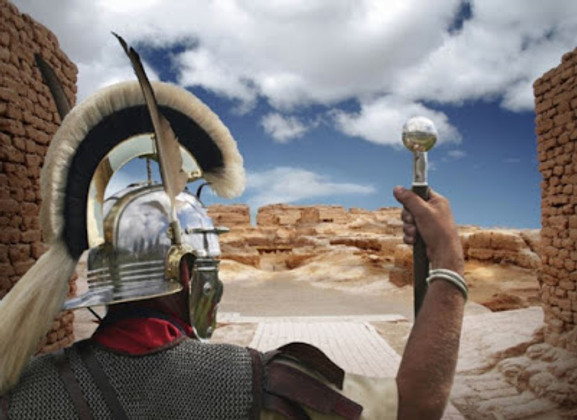An Ultimate Battle - Medieval Knights vs. Roman Legions
Posted by Sword N Armory on Jan 5th 2020
His breathing is heavy as he looks across the mist filled air toward his fellow warrior. For a moment they lock eyes, and only the look of awe in the other’s eyes could explain the inexpressible landscape upon which they stood. Between them lay bodies, almost countless by number, strewn across a blood soaked and soggy terrain. As far as the eye can see lie snapped bows, dented shields, beautifully crafted but blood and mud marred swords and thousands of various pieces of armored protection.
Now the question is posed, who won this battle?
The strong and intimidating renowned mass known as the Roman Legion or the highly regarded and deeply respected Medieval Knights. This battle assuming all available soldiers from each side were to partake, may actually be akin to the most bloody and deadly war on American soil, the Civil War. Of course the side simply known as the 'North' would be representative of that mighty Roman Legion, having outmatched the enemy easily in numbers and financial backing. Yet as history plainly illuminates, the side referred to as simply the 'South' more than merely threatened to topple the greater and more wealthy enemy.
Taking a quick glimpse and using these three considerations in each scene, where was the fight held, what weapons were used and tactical strategies, maybe the outcome will become more evident.
The Battlefield
The often wet, almost always soggy marsh lands of England would have greatly benefited the Knights in the case of familiarity and mobility. Just the understanding of the lack of visual clarity from any real distance would have also would unassumingly benefited the gallant Knights in tactical strategy as well. By the same token, many of the barren and dry terrains most often encountered by the heralded Romans would have been an advantage in tactics and better enabled this massive army to utilize the sheer numbers advantage. Yet with the incredibly encompassing territories under the Roman reign it isn't at all improbable that some familiarity with a variety of battlefields was known to them.
Weapons
This would almost have to be a draw anyway it is divided. The quality of weapons and armor were heavily on the side of the extremely skilled Knights. The longbow alone was a massive advantage. The armor was better made, and provided much better coverage also. Not so fast said the Roman warriors. The use of the ballista would have been deadly for the horseback carried knights and the short sword would have most likely been a much better weapon in close quarter fighting. As this discussion is not a new one, another prominent point was made by others who have made this debate. That's the incredible aptitude of assimilation that the Romans culture itself was known for, so in theory it would only have taken a couple of battles before the Roman technology rivaled that of their enemy Knights.
Battle Strategy
Much like the weapons discussion, this may be too close to call. It'd likely have come down to which army best would execute their strategy. It's a near given that the Roman strategy was to simply overwhelm an enemy, and run straight through them. It is much harder to determine what strategy the Knights would have utilized given that a typical battlefield situation wasn't as common to these warriors as it was for the Romans. In any case, a great deal of division and flanking would have been utilized most likely to counteract the size disadvantage. Once again this feels much like the North vs. South war.
The use of random and unpredictable attacks in the most unexpected ways would've been heavily relied upon one would've to assume.
Many who've considered this discussion have asked how a battle among equal numbers would have ended up. That may not have made the outcome any easier to predict! The Romans were in essence well trained barbarians who thirsted for battle. The Knights were generally educated and exceptionally skilled men who held pride as a badge of honor. So who wins between Romans who consider death on the battlefield a joy of the gods, or the highly trained, honor driven Knights don't even consider losing realistic?
The two men, respectful of the bodies of the dead warriors beneath their feet slowly and tiredly make their way toward each other until they stand face to face. A silence so loud its deafening sits between them. As the large man wipes blood from his brow he tosses a thick short sword to the ground. The other tall thin warrior slowly slides his narrow well-crafted sword into the sheath on his belt.
Without a word they each ask themselves, who won?












